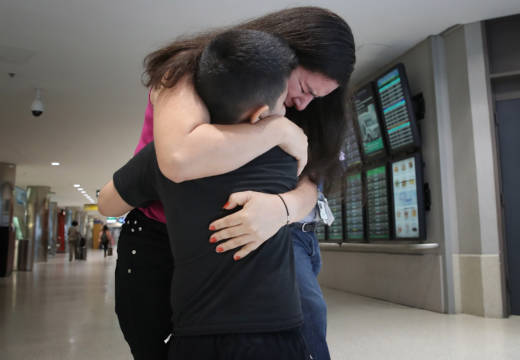The plaintiffs argued that families had been so traumatized by the forcible separation that they may not have been able to make credible asylum claims initially.
But some advocates objected to the settlement because it excludes more than 400 parents who were deported without their children.
Those parents had to choose between being reunited with their children in their home countries or leaving their children in the U.S. in hopes they’d be allowed to stay.
In overruling that objection, Sabraw said the settlement addresses the issue of deported parents by allowing the ACLU to bring individual cases to the government to reconsider allowing them to reapply for asylum.
“The judge instructed the government to operate in good faith when reviewing these cases,” Gelernt said. “We’re hopeful the government will agree to return these parents and, if not, we may have to bring that issue back to Judge Sabraw.”
Attorneys have 30 days to decide which cases of deported parents to bring to the government.
Gelernt was also satisfied that the court ordered the government to fix some issues that affect a minority of the families.
For example, two women who petitioned the court to be included in the settlement are legal guardians of children — not parents — who are still in the U.S. They said they should be allowed to reapply for asylum, the same as any parent.
The judge ordered the parties to meet and confer to resolve the question.
Most Children Reunited With Families
Even as the settlement agreement winds down, the court will continue to oversee the reunification of families that remain separated.
In court papers filed Nov. 8, the government reported that 2,666 children have been identified as having been taken from a parent. And of those, 2,458 children have already been discharged from the government’s care to a parent, relative or sponsor.
Judge Sabraw has set a status conference for Nov. 30 to get an update on the reunification process.
‘Unfit’ Parents
Not all issues will be resolved in the settlement, including the question of what happens to 30 children who will not be returned to parents whom the government deemed “unfit” or dangerous.
In one such case, “Ms. Q”, a mother from El Salvador, was separated from her 3-year-old son, “J”, at the border. She was sent to U.S. Immigration and Customs Enforcement detention in Laredo, Texas. Her son was sent to a child care facility in Chicago. After three months the government informed Ms. Q she was “unfit” to be reunited with her son because the Salvadoran government had issued a warrant for her arrest on suspicion that she was affiliated with a gang. Through attorneys, she said she came to the U.S. to escape gang violence, after she was badly beaten by gang members.
Attorneys representing Ms. Q and her son recently challenged the government’s decision not to reunite them, in U.S. District Court in Washington, D.C.
The Policy That Was Not a Policy
The Trump administration has denied any official policy of separating families, but said families had to be split apart when parents faced criminal prosecution for entering the country illegally.
The “zero-tolerance policy” of prosecuting all adults crossing the border unlawfully, was adopted in April this year and publicly announced by the U.S. Department of Justice in May.
When U.S. Customs and Border Protection officials transferred parents to courthouses along the border to face charges, they sent the children to facilities managed by the Office of Refugee Resettlement.
Parents who pleaded guilty to misdemeanor illegal entry were often returned to Border Patrol stations within hours, only to discover that their children had been taken away with no explanation of where they had been sent.
The separation of children, including infants, from their parents so outraged Americans that in June, President Trump issued an executive order to end the practice. That was followed, days later, by Sabraw’s order to reunite the families.

